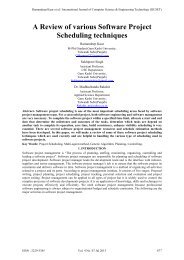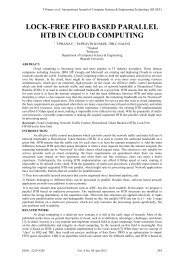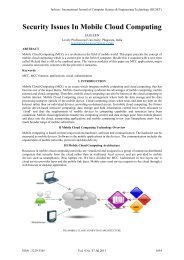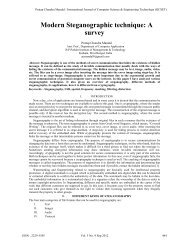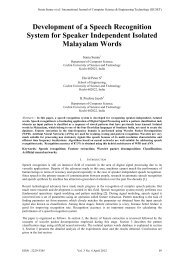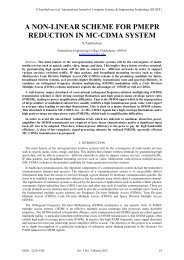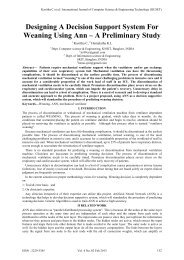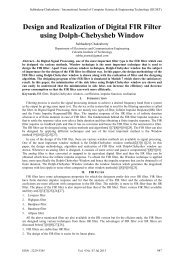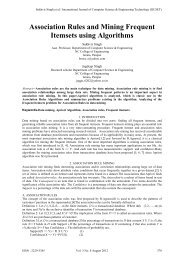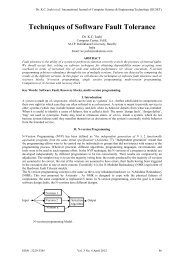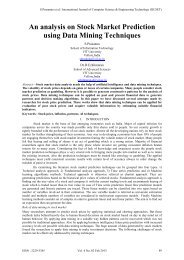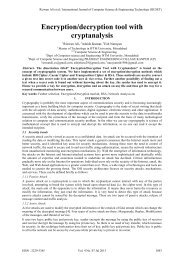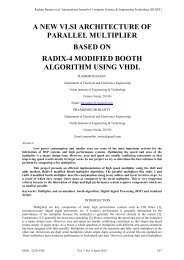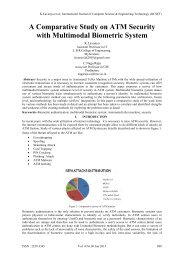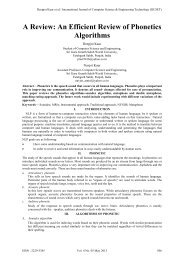Effect of Different Modulation on PAPR and Its Reduction - IJCSET
Effect of Different Modulation on PAPR and Its Reduction - IJCSET
Effect of Different Modulation on PAPR and Its Reduction - IJCSET
You also want an ePaper? Increase the reach of your titles
YUMPU automatically turns print PDFs into web optimized ePapers that Google loves.
Ritesh Baranwal et al./ Internati<strong>on</strong>al Journal <str<strong>on</strong>g>of</str<strong>on</strong>g> Computer Science & Engineering Technology (<strong>IJCSET</strong>)<br />
Figure7: <strong>PAPR</strong> <str<strong>on</strong>g>of</str<strong>on</strong>g> BASIC 4-QAM OFDM system with SLM Technique<br />
Figure 8: <strong>PAPR</strong> <str<strong>on</strong>g>of</str<strong>on</strong>g> BASIC 4-QAM<br />
OFDM system without SLM technique<br />
Also when we calculate the <strong>PAPR</strong> <str<strong>on</strong>g>of</str<strong>on</strong>g> BASIC OFDM system using QPSK, 4-QAM modulati<strong>on</strong> the value come<br />
out to be 10.28dB <strong>and</strong> 10.69dB as shown in figure 3, 8 But when we apply the phase rotati<strong>on</strong> technique to<br />
OFDM signal the reduced <strong>PAPR</strong> value come out to be 7.819dB, 7.451dB as shown in figure 5, 7.so the value<br />
reduced by 2.461dB, 3.239dB. From below Table 1 shows that more <strong>PAPR</strong> value is reduced with 4-QAM<br />
modulati<strong>on</strong> its come out to be 3.239dB.<br />
Table1: Comparis<strong>on</strong> <str<strong>on</strong>g>of</str<strong>on</strong>g> <str<strong>on</strong>g>Different</str<strong>on</strong>g> <str<strong>on</strong>g>Modulati<strong>on</strong></str<strong>on</strong>g> with <strong>PAPR</strong> <str<strong>on</strong>g>of</str<strong>on</strong>g> OFDM signal<br />
Comparis<strong>on</strong> <str<strong>on</strong>g>of</str<strong>on</strong>g> Peak to Average Power Ratio(dB) With &<br />
Without Phase Rotati<strong>on</strong> QPSK DQPSK 4-QAM<br />
Without Phase Rotati<strong>on</strong> 10.28 9.796 10.69<br />
With Phase Rotati<strong>on</strong> 7.819 8.111 7.451<br />
Difference in Peak To Average Power Ratio (dB) Without<br />
With Phase Rotati<strong>on</strong><br />
&<br />
2.461 1.685 3.239<br />
VIII. CONCLUSION<br />
Reducing <strong>PAPR</strong> <str<strong>on</strong>g>of</str<strong>on</strong>g> OFDM signal is important for increasing the performance Of Communicati<strong>on</strong> equipment. So<br />
in this paper <str<strong>on</strong>g>of</str<strong>on</strong>g> all the different modulati<strong>on</strong> (QPSK, DQPSK, <strong>and</strong> 4-QAM) <strong>on</strong> OFDM signal we can able to find<br />
the least <strong>PAPR</strong> <str<strong>on</strong>g>of</str<strong>on</strong>g> OFDM signal. Also optimize the <strong>PAPR</strong> value by phase rotati<strong>on</strong> technique, <strong>on</strong> doing different<br />
modulati<strong>on</strong> <strong>on</strong> OFDM signal. The proposed Selective Mapping with phase rotati<strong>on</strong> technique is simple <strong>and</strong><br />
achieves significant reducti<strong>on</strong> in <strong>PAPR</strong>. Results <str<strong>on</strong>g>of</str<strong>on</strong>g> simulati<strong>on</strong> <str<strong>on</strong>g>of</str<strong>on</strong>g> SLM technique show that the least <strong>PAPR</strong><br />
reducti<strong>on</strong> <str<strong>on</strong>g>of</str<strong>on</strong>g> OFDM system for 4-QAM modulati<strong>on</strong> <str<strong>on</strong>g>of</str<strong>on</strong>g> all three modulati<strong>on</strong>s sees table1. Which further results in<br />
high performance <str<strong>on</strong>g>of</str<strong>on</strong>g> wireless communicati<strong>on</strong>. With the rising dem<strong>and</strong> for efficient use <str<strong>on</strong>g>of</str<strong>on</strong>g> frequency spectrum,<br />
OFDM proves invaluable to 4G communicati<strong>on</strong> systems.<br />
ISSN : 2229-3345 Vol. 3 No. 8 August 2012 313



